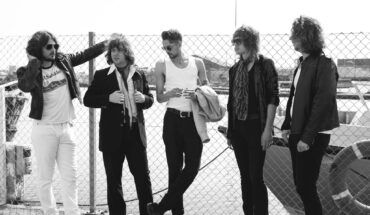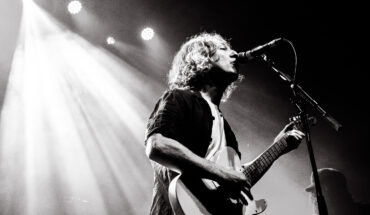How are ya? Not the most probing, Paxman-like of questions, but after a helter skelter few years, it seems like the only appropriate way to start when talking to Barry Hyde. The Futureheads frontman was diagnosed with bipolar disorder, got divorced, became obsessed with an iffy spiritual philosophy, has been in and out of a psychiatric hospital, changed careers and found himself in the Arizona desert doing blindfolded yoga and meditating in silence for hours upon end. Really, Barry, how are ya?
Thankfully, he has got things in order these days and is back with new album Malody.
“I’m very well indeed. I’ve got a good balance to my life now after the saga,” he says un-fussily. “After I was diagnosed, I really started to struggle with the idea that I had an illness that was going to be a huge problem for me for the rest of my life. Hearing that opinion can really crush you, but I’ve learned to be flexible with it. I can keep myself away from the risks of it becoming a chronic problem by having these small good habits in life.”
His problems starting building in 2011 in the wake of the Futureheads album The Chaos, but Hyde can recall points throughout his life when he felt things weren’t quite right:
“You keep thinking further and further back to find that moment, that kind of turning point. I wrote a song called ‘The Beginning of the Twist’ about it. That kind of moment where you go – what is going on? That album was in 2010, so I must have written it in 2009. And on the second Futureheads album which was released in 2006 there’s a song called ‘Thursday’ and it’s touching on this feeling of depression, and I can go further and further back.”
Initially it helped fuel his creativity and kickstart the band as they scored a top ten hit with their infectious cover of Kate Bush’s ‘Hounds of Love’ and became established favourites of the mid-2000s indie rock scene:
“It’s a strange experience because things started to change when I was 19. I had this significant moment when I was lying in bed and I had this first experience of mania. You could call it inspiration really, but it was wild inspiration going on. It was extraordinary. It was like getting struck by lightning. It was terrifying but it was amazing.”
“It’s like a kind of drug rush you know. It’s all these creative images being generated by something greater than we are. I feel like I tapped in to higher potential. But it’s like the brighter the flame, the darker the shadow. It felt almost like a spiritual experience. Life became much richer. My expression became much deeper and I was able to truly be creative, but then the shadows were there as well.”
His search for happiness led him to the teachings of Russian mystic George Gurdjieff and his Fourth Way philosophy. Other musicians including Robert Fripp, Peter Gabriel and Laura Marling have dabbled with his ideas before, but Hyde jumped in head first and found himself on a spiritual retreat in Tuscon with a group of lost souls that his teacher described as a ‘flock of black sheep.’
“I’d become very obsessed with something called esoteric knowledge. I became a student of the mystery school. I’m still very interested in it all actually. His whole thing was about knowing yourself and being conscious of becoming real.”
“It involves lots of meditation. This retreat is silent – there’s no speaking, so automatically when you swear an oath of silence you really change. You go into a different realm because you’re not speaking. You’re not communicating with words, so part of you kind of shuts off. You get a real break from yourself. I definitely left something of myself there that I’d like back, but I dunno where it has gone. I was really confused.”
Whilst his family were understandably concerned and his marriage was falling apart, his band mates looked on bemused as he came back and told them of his exciting plans for a new record:
“I wanted the fifth Futureheads album to be a concept based around the story of these two sisters. One of them was a vampire and one of them was benevolent and kind. As I’m saying this now it sounds completely insane. You can imagine what my fellow Futureheads band mates were thinking. I dragged them all into the pub and I tried to explain, and they were like – oh fuck he’s lost the plot. They were like – ‘under no circumstances Barry are we going to produce a vampire opera.’ I was like – well, fuck you I’m keeping these songs to myself.”
Some of those songs became the basis of album Malody, named after what would have been the lead character and a mash-up of the words melody and malady (meaning disease or sickness). It sees Hyde leave the guitars behind and pour his heart into dramatic piano ballads that strike personal and stark, but wild and majestic in their grandeur:
“I wanted this kind of intensity. One thing that I was always trying to do, mainly in the songwriting, was to have some sort of sense of elegance. Even with some of the harsher Futureheads songs like Man Ray and the post-punk stuff I tried to have this musicality in there.”
“The harmonies were our thing, that polyphonic feel. We weren’t opera singers, we were more about energy and shouting, so for this I wanted to something that I had never done. Consciously I had no percussion or anything synthy. No drums, no electric instruments, no harmonies. It’s a completely different environment already just by changing those things. So it’s about singing quietly and using quietness as one of the keys to intensity. The piano is the instrument of instruments. What you’ve got in front of you is the frequency of every single instrument in an orchestra.”
As frontman of The Futureheads, Hyde was a tense ball of energy slashing hard at his guitar and producing jerky, art-rock singalongs that sent a loyal and boisterous following into bouncy, beer soaked, frenzy. His love affair with the piano started at a young age though, when his parents bought one for £2 from a local pub.
“It stank of beer and tobacco. It must have been in this pub for thirty years. I used to sit there, I was obsessed. We couldn’t afford lessons, so I was just tinkering about really. I didn’t start playing it properly until I was asked to join my brother’s band Hyde and Beast.”
Soon after that he found himself living in a six bedroom vicarage in Sunderland with a gang of eccentric, free-spirited musicians, playing the piano until his heart was content. “It was the massive house with an acre of garden and apple trees and plum trees. There was a fountain. It was really vivid times, we were mad men – totally out of it. I thought I was Gurdjeff!”
“This guy called Adam from the Czech Republic came to live with us who was a former Hari Krishna monk. He was a clarinetist, and we would sit up all night playing gypsy music. It was like this kind of bohemian way of life. I played flamenco guitar with this toothless vagabond and Adam was playing clarinet – it was so far out, you know. I flew too close to the sun, and fell. What goes up, must come down.”
Spending time in the Cherry Knowle psychiatric hospital helped Hyde find some order, and he went in search of a more structured life by working as a pastry chef before becoming a teacher of performing arts. The piano continued to be a constant outlet in his life though, and you can feel some his frustrations being unleashed at times on the album. ‘Monster Again’ in particular is a storm of emotion with Hyde questioning “Who am I?/What am I?” whilst hammering away at the keys: “The piano in the studio had to be repaired many times,” he laughs, “I think might play too hard, but I was the same with the guitar – I’m very heavy handed!”
Opening track ‘Theme’ is more graceful and brooding in tone, instantly tackling Hyde’s mental health issues and search for balance – “How can I expect this madness to end/By staring at myself, and tearing myself apart.” It’s a big departure from his days crashing around in dingy indie clubs with spiky guitars and moshing throngs, but a move he embraces: “Futureheads fans really don’t know what to make of my solo work. It has to be that way. If it wasn’t, I wouldn’t feel like I was doing anything different.”
“I don’t want sweaty boys at my gigs – I’m sick of them. I want to be as far away from them as possible. I want people to come to my gigs and sit down and wear comfortable clothes and I want them to smell nice. I wanna play churches and theatres and just have a different experience, a more – dare I say it – middle-aged experience. A more sensible experience for someone in their mid-30s. I like to sit down. I want to be coming off and playing with my step-daughter, not embarking on some wild escapade and ending up dead. Those days are over.”
The danger and excitement hasn’t completely gone from his life though. Hyde was recently hired to go into the high security Franklin Prison in Durham and work with life sentence servers:
“It’s where Harold Shipman was and Ian Brady. They were interesting. Some of them were in for two life sentences – you don’t get a double life sentence for stealing cars! I was in the psychiatric unit within the prison. I’m just glad they let us out!”
“They were really into it. The whole project was to do with the centenary of the First World War. We used love letters that were written in the trenches that were sent back to the UK as subject matter. They were archived love letters that Durham Council have which they released for us to look at. The prisoners read them and went away and they wrote their own poetry.”
“One of them could play the bass. One of them was a compulsive liar. He told us he could play the bagpipes – I said no, you fucking can’t. But I’m going to go back in and play a concert for them. I’m writing a three-part suite and they’ve had some influence as to what that is going to be. It’s going to be recorded with a brass band and a choir. I’m going to try and make it an epic.”
“When you go into a prison there’s this hypnotic feeling as you go through all the gates and the guy who was looking after us was unlocking all the different layers of locks – it was like on onion. It’s like there’s no way you are getting out of here through the fifteen locks from your cell to that front door. You’re doomed. Psychologically that must be massive for these men, its crazy stuff.”
Hyde also has plans to record orchestral versions of Futureheads songs, and although staying healthy is the main priority, he’s bubbling with ideas and excitement again. The intoxicating extremes might be over, but he has his many decent days and nights to look forward to.
Huge thanks to Barry Hyde for answering our questions!
Malady, the new solo album from Barry Hyde, is out now on Sirenspire Records. Visit his Pledge Music page here.
Kevin Irwin
@TrotterFist




